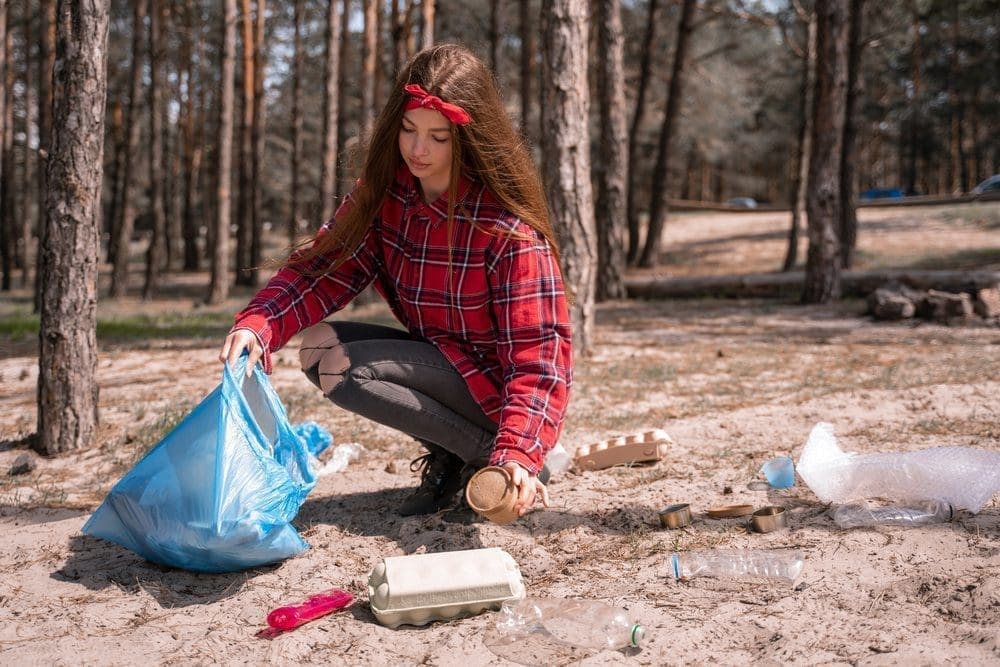

Plastic waste and the pollution that results from the use of plastics is extremely damaging to both the planet and to humans. Every year, nearly 300 million tons of plastic waste is produced on a global scale. And in the U.S. alone, 287 pounds of plastic waste is generated per person, with around 42 million metric tons of plastic waste being generated annually.
Despite the belief that plastic is safe due to its recyclability, not all plastics are recyclable, and even the ones that are often do not get properly recycled. Only about 9% of plastic gets recycled, while the rest either gets incinerated or ends up in landfills and natural environments.
However, not only is plastic waste an issue, but every stage of the plastic lifecycle—from manufacturing and production to transportation, consumer use, and then disposal—contributes to pollution and poses a risk to human health.
How Plastic Waste Affects Human Health
Plastics are everywhere, especially toxic microplastics. They end up in our food, our drinking water, our clothes, and more. Recent studies and reports have shown that plastic waste is a serious problem that poses a significant human health crisis.
- In the extraction and transport phase of the plastic lifecycle: Emissions produced from this process release harmful chemicals into the atmosphere which are then inhaled or ingested by humans from the air and water. This can affect the immune system, organs, and can result in cancer and neurological and reproductive issues.
- In the refining and manufacturing phase: Energy used to produce plastics in this phase also emits harmful chemicals into the air, which can affect humans through inhalation and skin contact. This can cause cancer, neurotoxicity, eye and skin irritation, reproductive complications, and developmental issues.
- In the consumer use phase: Products that contain plastics can emit heavy metals, POPs (persistent organic pollutants), carcinogens, EDCs (endocrine disrupting chemicals), and microplastics, which humans can be exposed to through skin contact, inhalation, and ingestion. This can affect renal function, the cardiovascular system, the digestive system, the brain, the reproductive system, and the respiratory system. It can also cause cancer, diabetes, and developmental toxicity.
- In the waste management phase: Toxic recycling, incineration, and improper disposal of plastics can result in the emission of heavy metals, dioxins, furans, PAHs (polycyclic aromatic hydrocarbons are a class of chemicals that occur naturally in coal, crude oil, and gasoline), and more. Humans are then exposed through inhalation and ingestion, which can lead to cancer, neurological disorders, immune system failure, and damage to the reproductive, nervous, and endocrine systems.
How Plastic Waste is Harming the Environment
Plastics that are not properly disposed of or those that can’t be recycled generally get incinerated, which emits harmful pollution into the atmosphere, or they get dumped into landfills or natural environments like the ocean where they pose a threat to animals and the planet as a whole. Plastics that sit in landfills take years to break down and over time they can leak harmful toxins and chemicals into the soil and groundwater.
Plastic waste that ends up in the ocean and other natural environments is also detrimental to our planet and the creatures and organisms that live both on the land and in the sea. It is estimated that nearly 700 species could go extinct as a result of plastic waste and the resulting habitat loss.
Each and every organism and the ecosystems they live in plays a crucial role in the survival of our planet. When species start to go extinct, it disrupts biodiversity and the balance of our ecosystem, which throws everything off and can have disastrous results for humans and nature. Plastic production requires and contributes to the use of fossil fuels, which are incredibly harmful to the atmosphere and lead to climate change.
What You Can Do to Help
It is everyone’s responsibility, including individuals and organizations, to step up and mitigate further damage to our planet. At this point, some effects may be irreversible, but it is possible for us to stop further damage from happening if we take swift and thorough action. Businesses and organizations can help by implementing sustainable business practices, spreading awareness, and producing more eco-friendly products. Businesses can make an even bigger impact by adopting the same environmentally proactive practices that individuals and households employ.
As an individual, you can help by
- Recycling
- Buying products made from recycled materials
- Supporting local sustainable businesses
- Donating to eco-friendly organizations and causes
The Polly Products Green Mission
At Polly Products, we’ve made it our mission to reduce our environmental impact as much as possible by providing 100% recycled products and by adopting sustainable business practices. Our team of compassionate environmental advocates in rural Michigan shares humble values and believes in delivering quality products.
We proudly supply environmentally responsible outdoor furniture, 100% made and assembled in the USA. Check out our line of products to see how Polly Products is making a difference.








